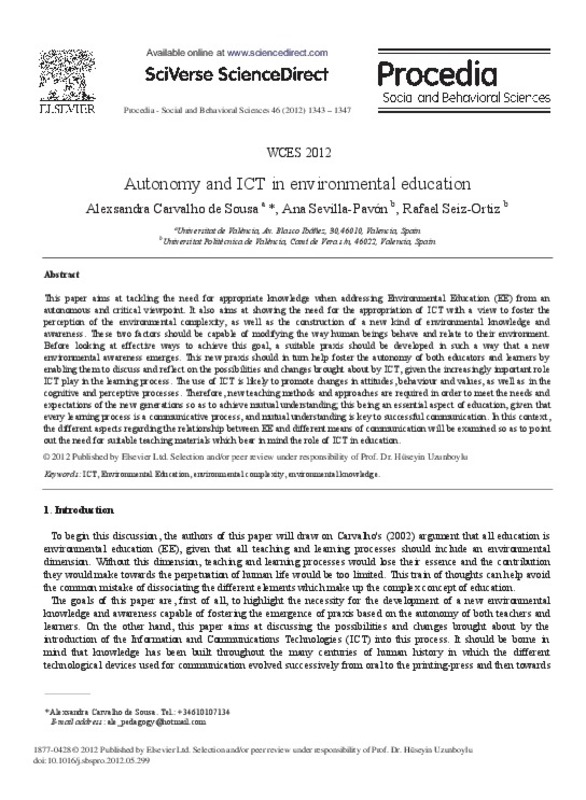JavaScript is disabled for your browser. Some features of this site may not work without it.
Buscar en RiuNet
Listar
Mi cuenta
Estadísticas
Ayuda RiuNet
Admin. UPV
Autonomy and ICT in environmental education
Mostrar el registro sencillo del ítem
Ficheros en el ítem
| dc.contributor.author | Carvalho de Sousa, Alexsandra
|
es_ES |
| dc.contributor.author | Sevilla Pavón, Ana Mercedes
|
es_ES |
| dc.contributor.author | Seiz Ortiz, Rafael
|
es_ES |
| dc.date.accessioned | 2018-04-13T04:13:40Z | |
| dc.date.available | 2018-04-13T04:13:40Z | |
| dc.date.issued | 2012 | es_ES |
| dc.identifier.issn | 1877-0428 | es_ES |
| dc.identifier.uri | http://hdl.handle.net/10251/100328 | |
| dc.description.abstract | [EN] This paper aims at tackling the need for appropriate knowledge when addressing Environmental Education (EE) from an autonomous and critical viewpoint. It also aims at showing the need for the appropriation of ICT with a view to foster the perception of the environmental complexity, as well as the construction of a new kind of environmental knowledge and awareness. These two factors should be capable of modifying the way human beings behave and relate to their environment. Before looking at effective ways to achieve this goal, a suitable praxis should be developed in such a way that a new environmental awareness emerges. This new praxis should in turn help foster the autonomy of both educators and learners by enabling them to discuss and reflect on the possibilities and changes brought about by ICT, given the increasingly important role ICT play in the learning process. The use of ICT is likely to promote changes in attitudes, behaviour and values, as well as in the cognitive and perceptive processes. Therefore, new teaching methods and approaches are required in order to meet the needs and expectations of the new generations so as to achieve mutual understanding; this being an essential aspect of education, given that every learning process is a communicative process, and mutual understanding is key to successful communication. In this context, the different aspects regarding the relationship between EE and different means of communication will be examined so as to point out the need for suitable teaching materials which bear in mind the role of ICT in education. | es_ES |
| dc.language | Inglés | es_ES |
| dc.publisher | Elsevier | es_ES |
| dc.relation.ispartof | Procedia - Social and Behavioral Sciences | es_ES |
| dc.rights | Reconocimiento - No comercial - Sin obra derivada (by-nc-nd) | es_ES |
| dc.subject | ICT | es_ES |
| dc.subject | Environmental Education | es_ES |
| dc.subject | Environmental complexity | es_ES |
| dc.subject | Environmental knowledge | es_ES |
| dc.subject.classification | FILOLOGIA INGLESA | es_ES |
| dc.title | Autonomy and ICT in environmental education | es_ES |
| dc.type | Artículo | es_ES |
| dc.type | Comunicación en congreso | es_ES |
| dc.identifier.doi | 10.1016/j.sbspro.2012.05.299 | es_ES |
| dc.rights.accessRights | Abierto | es_ES |
| dc.contributor.affiliation | Universitat Politècnica de València. Departamento de Lingüística Aplicada - Departament de Lingüística Aplicada | es_ES |
| dc.description.accrualMethod | S | es_ES |
| dc.relation.conferencename | 4th World Conference on Educational Sciences (WCES 2012) | es_ES |
| dc.relation.conferencedate | February 02-05,2012 | es_ES |
| dc.relation.conferenceplace | Barcelona, Spain | es_ES |
| dc.relation.publisherversion | https://doi.org/10.1016/j.sbspro.2012.05.299 | es_ES |
| dc.description.upvformatpinicio | 1343 | es_ES |
| dc.description.upvformatpfin | 1347 | es_ES |
| dc.type.version | info:eu-repo/semantics/publishedVersion | es_ES |
| dc.description.volume | 46 | es_ES |
| dc.description.issue | 1 | es_ES |
| dc.relation.pasarela | S\232007 | es_ES |








